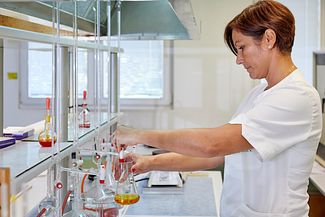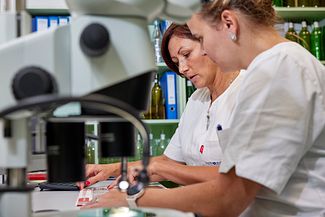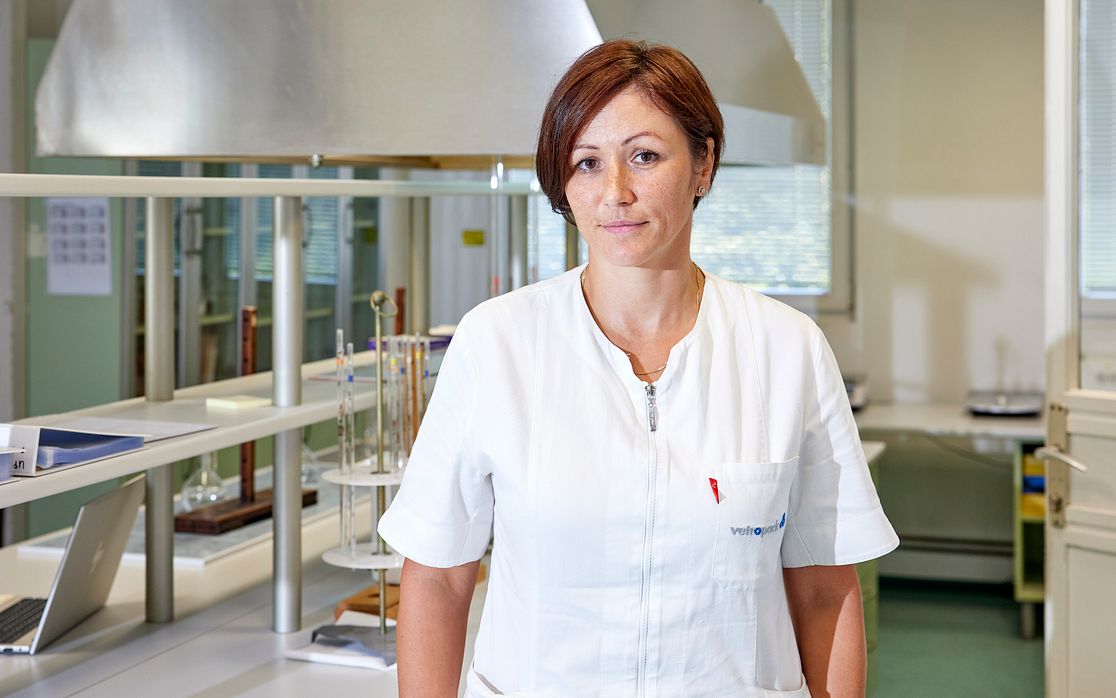A day with Ivana Brezinšćak
Ivana Brezinšćak, our Group Glass Chemistry Specialist, has been working to standardise batch formulas throughout the Group since March 2024. Her goal? To make sure that raw materials and cullet are used uniformly for glass production. This standardisation ensures consistent product quality, reduces our environmental footprint, and lowers costs.
A typical working day for Ivana Brezinšćak starts at seven in the morning in her favourite place at Vetropack Straža: the laboratory. This is where she analyses the previous day's raw materials and batch formulas. She simulates the effects of raw material changes on the computer. “What goes into the furnace is important,” she explains. “If you increase the dolomite and reduce the lime, you can save CO2. But if the dolomite quality is poor, the glass bottles can have defects.” This is why standardisation matters so much.
Ivana maintains constant contact on this issue with Andreja Tepeš, who manages the laboratory at Vetropack Straža: the two colleagues collaborate regularly on analyses. One aspect of her job that Ivana really appreciates is this mix of office work, laboratory work and practical assignments in the production environment. “This variety gives me a thorough understanding of the entire glass process,” she says.
Ivana works closely with all the furnace managers, and she travels regularly to the various Vetropack plants to take glass samples. She collects the samples every month and analyses them at Hum na Sutli. The analysis results are made available to all our furnace managers, helping them to understand how differences in specifications can still produce the desired colours and quality. “For example, if one site can produce the same colour with fewer raw materials, at less cost or with lower CO2 emissions, we want to see if we can put the same method into practice at the other sites as well,” Ivana explains.
Optimisations like these – together with trials aimed at producing glass without soda ash – are reducing Vetropack's greenhouse gas emissions and making the production process more sustainable. “I’m delighted to see these practical results of my work,” says Ivana, who is a qualified chemist. She enjoys improving glass chemistry because it’s a challenge – and it also allows her to play a direct part in achieving Vetropack's long-term sustainability goals.

She and her colleagues are currently preparing a project in Pöchlarn that aims to replace lime with dolomite. The goals are to reduce CO2 and costs, and to optimise the production process. “When we’re considering raw material substitution initiatives like this one, we simulate the changes in advance,” Ivana explains. “We also liaise closely with the procurement and production teams to ensure that all the changes are clearly communicated, understood and accepted.”
As a member of the Technology team, Ivana Brezinšćak works with many colleagues across all our sites, and she is highly appreciative of the teamwork: “The team is very committed and we always stand up for each other,” she comments. Ivana also values the support she gets from her colleagues and her line manager, and she appreciates the way they share their knowledge. “What’s more, working with people from different countries allows me to explore new ways of thinking and different approaches – so I gain new perspectives,” she adds.
Ivana has already gained quite a few new perspectives during her years at Vetropack. She started out in 2007 as a furnace technician in Straža and progressed to become a laboratory engineer. She managed our laboratory in Croatia for the last five years: “In that role, I handled the daily analyses and optimisations for Vetropack Straža. Now I'm concentrating on Group-wide standardisation, so I’m contributing my expertise to the entire Group by coordinating multiple sites,” she points out. Her expertise as a chemist is a key factor here, and the many years of experience she already acquired at Vetropack are equally important:

«I was able to gain first-hand knowledge of glass production and the daily challenges it presents. I’ve learned a lot from the team in Straža, and all this experience gives me a good basis for my current job. I believe my in-depth understanding of the production process is helpful with making informed decisions.»
She emphasises how important it is to hold joint discussions when making changes to raw materials and batch formulars, and to include everyone who plays a part in glass production: “The chemical composition of glass affects all aspects of the production process, from the melting temperature to the quality of the end product. That's why open communication and close collaboration are essential.”
Ivana Brezinšćak very much appreciates the good teamwork at Vetropack – and in her free time, she’s equally appreciative of the relaxation she gets by touring on her bike. Whether she’s cycling, spending time with her family or working in the garden, Ivana likes to be outdoors in nature – where she can top up her energy levels to tackle the ongoing challenge of developing glass chemistry at Vetropack.
